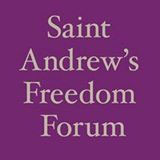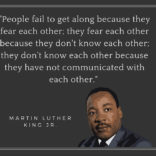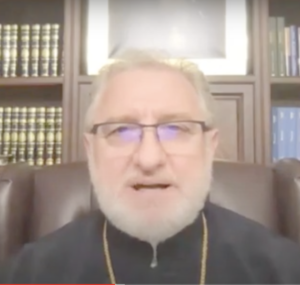Posted in Category One, Featured, News
Statement by President Joe Biden on Armenian Remembrance Day
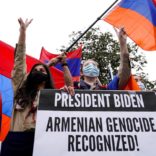
APRIL 24, 2021, The White House
Each year on this day, we remember the lives of all those who died in the Ottoman-era Armenian genocide and recommit ourselves to preventing such an atrocity from ever again occurring. Beginning on April 24, 1915, with the arrest of Armenian intellectuals and community leaders in Constantinople by Ottoman authorities, one and a half million Armenians were deported, massacred, or marched to their deaths in a campaign of extermination. We honor the victims of the Meds Yeghern so that the horrors of what happened are never lost to history. And we remember so that we remain ever-vigilant against the corrosive influence of hate in all its forms.
Of those who survived, most were forced to find new homes and new lives around the world, including in the United States. With strength and resilience, the Armenian people survived and rebuilt their community. Over the decades Armenian immigrants have enriched the United States in countless ways, but they have never forgotten the tragic history that brought so many of their ancestors to our shores. We honor their story. We see that pain. We affirm the history. We do this not to cast blame but to ensure that what happened is never repeated.
Today, as we mourn what was lost, let us also turn our eyes to the future—toward the world that we wish to build for our children. A world unstained by the daily evils of bigotry and intolerance, where human rights are respected, and where all people are able to pursue their lives in dignity and security. Let us renew our shared resolve to prevent future atrocities from occurring anywhere in the world. And let us pursue healing and reconciliation for all the people of the world.
The American people honor all those Armenians who perished in the genocide that began 106 years ago today.
https://www.whitehouse.gov/briefing-room/statements-releases/2021/04/24/statement-by-president-joe-biden-on-armenian-remembrance-day/
Read MorePosted in Annual Congressional, Category One, Featured, News
A Socially Just Democracy Makes For a More Perfect Union
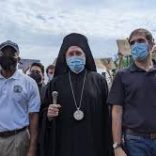
Read More
Posted in News
Sometimes the World is Black and White: Archbishop Iakovos and the Lesson of Selma
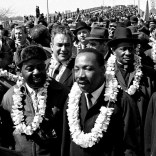
March 15 marks the half-century anniversary of the culmination of a dramatic series of events in American Civil Rights history that have been seared into the country’s national consciousness, events now remembered simply as “Selma.” On that day, captured for posterity in a moving cover photograph for LIFE magazine, the leader of the Civil Rights Movement, Rev. Martin Luther King, Jr., and the leader of the Greek Orthodox Church, Archbishop Iakovos, appeared together on a prominent national stage. They were brought together by recent violence, tragedy, and murder that had taken place in Selma, Alabama.
Risking their jobs, their homes, and their families’ physical safety, African-American residents in and around Selma, Alabama, took the first steps beginning in January 1965 in what would become a fateful civil rights campaign. Initiated by student activists and organized by ministers from the Southern Christian Leadership Council, local blacks attempted to register to vote, a basic civil and political right that they had been denied for generations after the post-Civil War Reconstruction in the South. Town and county officials repeatedly turned away all black citizens as they rejected every attempt by African Americans to register to vote. In response, the disenfranchised black community joined together in marches and peaceful demonstrations. Despite constant intimidation and provocations from local and state police, civil rights protesters continued to rally and march peacefully in adherence to the Christian principle of non-violent civil disobedience.
Frustrated by their failure to silence the Selma protests, Alabama police authorities, now joined by members of the Ku Klux Klan, militant segregationists, and other white supremacists, turned to open violence. On February 17, state troopers fired on and attacked a group of marchers in the nearby-town of Marion, killing a young Baptist deacon, Jimmie Lee Jackson, and wounding several others. In response to the killing and violence in Marion, the leaders of the Southern Christian Leadership Council prepared a march to take place from Selma to the state capitol of Montgomery, a distance of more than fifty miles.
On Sunday, March 7, some 600 marchers assembled outside a black community church in Selma to begin the journey to Montgomery. As they approached the Edmund Pettus Bridge (ironically, named in honor of a Confederate general) over the Alabama River they were blocked, mockingly ordered to disperse, and then violently attacked by state troopers and local police. Firing teargas canisters, mounted police and police on foot charged into the column of marchers, clubbing and beating both male and female protestors, ultimately hospitalizing more than 50 people. The police rampage was broadcast by television around the world. News and images of the violence stirred outrage across the country. In the view of many scholars, “Bloody Sunday,” as the violent event came to be known, and the following week of developments culminating on March 15, marked the critical turning point in the history of the Civil Rights Movement.
In response to the events of March 7, Rev. Martin Luther King, Jr., sent telegrams to prominent religious and civic leaders urging them to join him in protest in Selma against the recent violence. Hundreds of supporters responded and began arriving in Selma over the next several days. Shortly after his arrival in Selma, one of those supporters, Rev. James Reeb, a young white Kansas-born Unitarian Universalist minister and community organizer from Boston, was brutally beaten and murdered by a group of Klansmen. Rev. Reeb’s death, on March 11, produced a national uproar, prompting President Lyndon Johnson to address the nation in a televised broadcast in which he decried Reeb’s killing as an “American tragedy.” A memorial service for James Reeb was planned to take place in Selma, on Monday, March 15, at Brown Chapel, the church where marchers had first assembled on “Bloody Sunday.”
From his headquarters in New York, the head of the then Greek Orthodox Archdiocese of North and South America, Archbishop Iakovos, had been following the escalating events in Selma with growing alarm. On March 12, the day after the death of Rev. Reeb, the Archbishop telegrammed the minister’s widow: “The Greek Orthodox Archdiocese and our communicants extend deepest condolences and sympathy on the tragic death of your beloved husband, a minister of God who fought oppression of Human Rights and dignity and died heroically on the battlefield of mankind.” The following day, March 13, Archbishop Iakovos was asked by Rev. Robert Spike, Executive Director of the National Council of Churches Commission on Religion and Race to fly to Selma in order to represent the Greek Orthodox Archdiocese, the World Council of Churches (Iakovos was one of its presidents), and the National Council of Churches (Iakovos was its vice-president), at the memorial for Rev. Reeb. On March 14, Iakovos met in New York with his staff and advisors, made up of both priests and lay people, who counseled him against going to Selma. Iakovos’ advisors were concerned about the highly charged atmosphere in Selma, they were fearful about the Archdiocese taking any action that might prove to be politically unpopular, and they feared for the Archbishop’s personal safety.
Against the opposition of his staff and advisors, Iakovos resolved to go to Selma. On the morning of March 15, Archbishop Iakovos, accompanied by only one assistant priest, Fr. George Bacopoulos, and twenty other prominent clergymen representing various denominations flew into Selma on a small aircraft, which their pilot landed in a nearby cow pasture because he feared a violent reception awaited them at the town’s airport. Iakovos soon arrived at Brown Chapel where distinguished religious and community leaders from around the country had already gathered to eulogize James Reeb. As the highest-ranking religious leader at the memorial service, Iakovos was given a place of honor on the dais, from where he spoke to the nearly 4,000 mourners who filled the church to capacity and poured outside, saying:
I came to this memorial service because I believe this is an appropriate occasion not only to dedicate myself as well as our Greek Orthodox communicants to the noble cause for which our friend, the Reverend James Reeb, gave his life; but also in order to show our willingness to continue this fight against prejudice, bias, and persecution. In this God-given cause, I feel sure that I have the full and understanding support of our Greek Orthodox faithful of America. For our Greek Orthodox Church and our people fully understand from our heritage and our tradition such sacrificial involvements. Our Church has never hesitated to fight, when it felt it must, for the rights of mankind; and many of our Churchmen have been in the forefront of these battles time and again….The ways of God are not always revealed to us, but certainly His choice of this dedicated minister to be the victim of racial hatred and the hero of this struggle to gain unalienable constitutional rights for those American brethren of ours who are denied them, and to die, so to speak, on this battlefield for human dignity and equality, was not accidental or haphazard. Let us seek out in this tragedy a divine lesson for all of us. The Reverend Reeb felt he could not be outside the arena of this bitter struggle, and we, too, must feel that we cannot. Let his martyrdom be an inspiration and a reminder to us that there are times when we must risk everything, including life itself, for the basic American ideals of freedom, justice, and equality, without which this land cannot survive. Our hope and prayer, then, is that we may be given strength to let God know by our acts and deeds, and not only by our words, that like the late Reverend James Reeb, we, too, are the espousers and the fighters in a struggle for which we must be prepared to risk our all.”
Some time later, Rev. King arrived and offered his own stirring eulogy to the congregation. Eventually, as the mourners moved to exit the crowded church, Rev. King paused for a moment over the threshold of the doorway of Brown Chapel, locked hands with Iakovos, and spoke quietly and privately to the Archbishop. From there, the two religious figures led the crowd of thousands in a solemn, peaceful, half-hour-long procession to Selma’s courthouse. At the center, leading the march, was Dr. King carrying a purple and white memorial wreath, next to King on his right was Archbishop Iakovos, and to King’s left were Rev. Ralph Ralph Abernathy and Andrew Young. A resolute Iakovos, appearing stoic but dignified in his flowing black cassock and skufia, and clutching his archiepiscopal staff, towered physically over all others around him, capturing both the awe of spectators who had lined the streets and the curiosity of hundreds of reporters, photographers, and cameramen who followed the procession along its entire march.
When Rev. King and Archbishop Iakovos reached the courthouse, they found the building locked from the inside. They and the other dignitaries leading the procession climbed the courthouse steps and then turned to face the almost 4,000 people who had followed them. At that precise moment a photographer captured the image of Iakovos and King together that would appear on the front cover of the March 26 issue of the immensely popular, ubiquitous Life magazine, an indelible and still incomparable visual impression of the presence of Orthodox Christianity in American history and society.
Following the conclusion of the memorial, Fr. Bacopoulos left for New York and Archbishop Iakovos flew to visit the Greek Orthodox parish of Holy Trinity in Charleston, South Carolina. Since his enthronement as Archbishop in 1959, Iakovos had begun a concerted effort to visit all of the parishes in the Archdiocese, and his return from Selma afforded him an opportunity, which he had not previously realized, to meet his fellow Orthodox Christians in Charleston. However, upon his arrival in Charleston the Archbishop experienced bigotry and a backlash from his own people. Not a single member of the Charlestown Greek Orthodox community appeared for scheduled events, and Iakovos found himself alone in a hotel room fielding a stream of hostile phone calls throughout the night from Greek Americans across the country that were enraged by his presence in Selma earlier that day.
In the years that followed Selma—marked by the subsequent legislative triumphs initiated by the Civil Rights Movement, and the expanding enlightenment of society around race and equality—more and more people, including the vast majority of Greek Orthodox Americans, came to appreciate Archbishop Iakovos’ role in the Civil Rights Movement. Today, Greek Orthodox Christians in America rightly take reflective pride in the courage, vision, and dignity that Archbishop Iakovos displayed in the face of hatred, racism, and persecution. Iakovos, unlike most of his white hierarchical contemporaries in the Roman Catholic and major Protestant Churches, especially during the early years of the Civil Rights Movement, was a consistently outspoken foe of racial intolerance and inequality throughout his entire period of archiepiscopal leadership. Indeed, eulogizing the Archbishop’s death in 2005, Rev. King’s widow, Coretta Scott King, reflected that “at a time when many of the nation’s most prominent clergy were silent, Archbishop Iakovos courageously supported our Freedom Movement and marched alongside my husband, and he continued to support the nonviolent movement against poverty, racism and violence throughout his life.”
Without a doubt, Iakovos’ personal life experience growing up persecuted and discriminated against as an Orthodox Christian in Kemalist Turkey significantly influenced his unique perspective and distinguished him from other white major religious leaders in America. Archbishop Iakovos knew all too well the harsh realities that defined life as a member of a minority traumatized by a history of enslavement. Growing up as a Greek Orthodox Christian and citizen of the Republic of Turkey he had confronted daily the legacy of enslavement: the humiliations and insecurity that came with living in a society where his basic freedoms and rights were denied, where persecution, oppression, and arbitrary violence against his community were commonplace and justified by law. Given his past, Iakovos identified with African Americans in ways that most Americans, including most Greek Americans, were never aware of or could never fully comprehend.
Ultimately, it was Iakovos’ faith that decisively determined his engagement with the world. In short, the Archbishop was an unwavering, consistent advocate of the Civil Rights Movement because he was an Orthodox Christian, in deed and action, not only in word. For Iakovos, some of the most basic principles of Orthodoxy—freedom, equality, justice, and the dignity and worth of all lives—were existential realities for all of humanity, because of God’s grace. Denying people basic rights, persecuting individuals and communities on the basis of race, religion, or culture, constituted a rupture with God because it desecrated our sacred responsibility to accept and love all of humanity and to recognize that each and every person, regardless of race, is created in the image of God. At Selma, Iakovos took the very unpopular action, at that time, to stand alongside Rev. Martin Luther King, Jr., in defense of the powerless, the disenfranchised, the downtrodden, and the poor because the Archbishop not only preached theology, he lived Orthodoxy. Iakovos was determined to bring the beauty of his faith and Church into the real and sometimes ugly and brutal world, locking arms with Rev. King as a sign that we all must participate in transforming the world around us.
There was no ambiguity in Archbishop Iakovos’ decision to embark upon the road to Selma—for him it was a moral obligation. He truly revered and practiced the tenets of Orthodox Christianity, including the realization that there are moral absolutes, that often there is a right and a wrong, that, indeed, the world is sometimes black and white, and that such truths warrant recognition and action in their defense. This is the fundamental lesson to be drawn by the noble, inspiring example set by Archbishop Iakovos at Selma.
Rev. King often stressed that silence and inaction in the face of injustice and persecution was a betrayal of Christian principles. Indeed, King famously noted “our lives begin to end the day we become silent about things that matter.” Today, the Greek Orthodox Church in the United States—its hierarchy, clergy, and laity—has a moral obligation and a religious responsibility to rededicate itself to the things that matter, meaning that the Church must work unceasingly to contribute to the societal goals for which Rev. Martin Luther King, Jr., and Archbishop Iakovos marched together on that fateful day in Selma in 1965.
Dr. Alexandros K. Kyrou is Professor of History at Salem State University, in Salem, Massachusetts, where he teaches on the Balkans, Byzantium, and the Ottoman Empire.
Read MorePosted in News
Interfaith dialogue vital to face today’s challenges, Christian-Muslim gathering hears, Ecumenical News
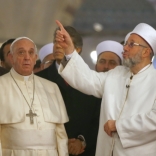
Pope Francis listens to Rahmi Yaran, Mufti of Istanbul (R) during a visit to Sultan Ahmet mosque, popularly known as the Blue Mosque in Istanbul November 29, 2014. Pope Francis began his visit to Turkey with the delicate mission of strengthening ties with Muslim leaders while condemning violence against Christians and other minorities in the Middle East.Photo: REUTERS / Tony Gentile
Interreligious dialogue and opening hearts and minds to others are needed to face today’s troubled times, participants in the Third Catholic-Muslim Summit held in Rome last week said.
“Our meeting here, I would think, is a sign of hope for our troubled world.
“It is a message to all humanity, especially to us, the members of the great family of Abraham – the Jews, the Christians, and the Muslims,” said Cardinal Jean-Louis Tauran, president of the Pontifical Council for Interreligious Dialogue.
He spoke following the December 2-4 meeting, which was entitled “Christians and Muslims: Believers living in Society.”
Along with Tauran, summit leaders included Prince Hassan bin Talal of Jordan; Mostafa Mohaghegh Damad, an ayatollah and director of Islamic Studies at Iran’s Academy of Sciences; and John Bryson Chane, a bishop in the U.S. Episcopal Church.
Also attending was Metropolitan Emmanuel of France, representing the Ecumenical Patriarchate of Constantinople, and Rabbi Abraham Skorka, from Buenos Aires, Argentina.
Rabbi Abraham Skorka, a friend of Pope Francis, said at the summit, saying, “In the 20th century were consummated horrible crimes in the name of new anthropomorphic religions. Nazism and Stalinism killed millions of human beings on the altar of their fanatic and insane beliefs.”
Bishop Chane stressed that “Christianity and Islam have at this moment in time a great opportunity to work together effectively with governments and civil societies currently in turmoil,” the Catholic News Agency reported
“They can begin to re-shape a culture of peace in a world too much torn apart by sectarian violence and political pilfering. Christianity and Islam can and must be the bridge builders of the 21st century,” he concluded.
Prince Hassan bin Talal said “the schisms in the world today have become so numerous, the inequities and inequalities so stark, that a universal respect for human dignity must once again be brought back to the consciousness of the international community.
“Now, more than at any other time, an ethic of human solidarity and a new international order are required.”
Participants agreed a renewed Christian and Muslim dialogue is needed now, starting from mutual acceptance so as to find a common path.
Cardinal Tauran noted that “the legitimate differences – ethnicity, religion, culture, political choices – should not be a reason for refusing the other, ignoring him or her, marginalizing, persecuting, or even eliminating him or her, as is unfortunately the case in our days, especially in Iraq and in Syria, and in particular towards the Christians and Yazidis.”
The Christian-Muslim Summit is a gathering of Christian and Muslim leaders from around the world.
At it, experts from both religious traditions come together for interreligious and intercultural relationship building and to address issues of conflict that exist between religions and nations.
Pope Francis met the summit participants on December 3, reminding them that dialogue is “the path to peace.”
The fourth summit is expected to be held in Iran, CNA reported.
Read MorePosted in News
Pope Francis’ Pilgrimage to Turkey Reflects Past and Future
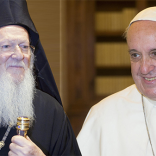
Like a firefighter compelled to enter a dangerous space, not avoid it, Pope Francis is on a mission to Turkey, a land so significant to the birth and early growth of Christianity, yet stunted in the all-important tasks of calming regional tensions and improving Christian-Muslim relations.
The country has changed in significant ways since the last papal visit, in November 2006, when Pope Benedict XVI faced the same two leaders: Recep Tayyip Erdogan, then prime minister, now President; and Ecumenical Patriarch Bartholomew I, spiritual leader of the 260 million-member Orthodox Christian Church, based in Istanbul, once known as Constantinople.
Anti-Christian hostility — against all Christians, whether Catholic, Orthodox or Protestant — has increased in the last eight years, both domestically and in Turkey’s immediate neighborhood.
Pressure on the ecumenical patriarch of Constantinople has also increased from Turkish authorities and within the family of Orthodox Churches, especially from the Russian Orthodox Church. Pope Francis has developed a close bond with Ecumenical Patriarch Bartholomew and wants progress toward Christian unity to continue — which is the main reason for this trip.
But external actors with less-peace-driven goals than Pope Francis’ could easily drown his delicate efforts; in our world, it seems far easier to cause trouble than to make peace.
Embodying History
Pope Francis, in word and deed, embodies the apostolic succession.
His itinerary mimics the path followed by Pope Benedict XVI, whose silent prayer in Istanbul’s Blue Mosque was a huge gesture of respect toward Islam, positively noted by the Muslim world.
In his equanimity toward the mercurial Turkish government, Pope Francis is following Pope St. John XXIII, who, as Angelo Roncalli, spent 10 years (1934-44) as apostolic delegate to Turkey and Greece.
Archbishop Roncalli was fluent in Turkish, allowed Turkish to be used in Church ceremonies and documents and became one of the most popular and influential diplomats in the country. He used this influence on behalf of the Church — the government agreed to uncover Christian mosaics in the Hagia Sophia, for example — and on behalf of the persecuted, such as Jews fleeing Europe, whom he helped transit Turkey in order to get to Palestine.
Pope Francis and Patriarch Bartholomew have already marked, in Jerusalem earlier this year, the accomplishment 50 years ago of their predecessors, Pope Paul VI and Patriarch Athenagoras I, who, together, resuscitated relations between the Catholic and Orthodox Churches by meeting in 1964 in the Holy Land. Three years later, Pope Paul VI traveled to Turkey as the first Catholic pope to visit in more than 1,000 years.
On this trip, Pope Francis continues the pursuit of Christian unity as he celebrates with Bartholomew the Nov. 30 feast of St. Andrew the Apostle — and St. Peter’s brother — who founded the Christian Church in the East.
St. John Paul II’s spirit travels with the Holy Father in the conviction that personal encounter is the key to deeper sympathy and understanding.
And, of course, in the main outline of his message — that violence in the name of religion must be actively opposed by all and that division between Catholic and Orthodox Christians offends God’s will — the Holy Father echoes his righteous predecessors of the contemporary era.
Tense Times
On several visits to Turkey over the last two years, I’ve noted that fear is palpable in many Christian communities. There’s a sense that, to be safe in Turkey, you need to be low profile.
Few priests or ministers are willing to speak on the record; Christians running successful charities, especially for the surging number of refugees, ask not to be identified publicly in order to protect their efforts.
An Anglican minister told me, “Our church is full every Sunday. I want to preserve my ability to function, and any public discussion of Christians at work in Turkey undermines that.”
Churches in the capital city, Ankara, are unmarked and protected by gates; churches in other cities are often hard to find. You can walk by the cathedral in Istanbul, where Pope Francis offered Mass yesterday, five times and still be wondering where it is. Holy Spirit Cathedral is located on a major boulevard, but it’s behind an unmarked gate.
In the last eight years, two priests committed to interfaith dialogue have been brutally murdered: In 2006, while kneeling in prayer in his church, Father Andrea Santoro was shot in the back of his head by a 16-year-old student who yelled, “Allah Akbar!” (God is great!) The gun used was traced back to the Iraqi army.
In June 2010, just before traveling to meet Pope Benedict in Cyprus, Bishop Luigi Padovese, apostolic vicar of Anatolia and president of the Turkish Bishops’ Conference, was killed by his 26-year-old driver, who supposedly yelled, “Allah Akbar!” right after. Last year, the murderer was sentenced to 15 years, including time served. The government blames mental illness, but the driver was deemed competent for trial.
Earlier this year, five men accused of torturing and killing three Protestant missionaries at a Christian publishing house in 2007 were released from a high-security jail on a technicality. Six others charged in the same murder were already free. The alleged perpetrators were all between 19 and 20 years old, and several knew the victims. That same year, a well-known Armenian Christian editor, Hrant Dink, was shot in the head on an Istanbul street by a 17-year-old student.
Religious Radicalization
Although the murder rate is down, Turkey shows signs of increased religious radicalization, too often encouraged by authorities.
Muslim demonstrators’ (and 15 million petition signers) demands that the world-famous Hagia Sophia Church — a museum since 1934 and a mosque under the Ottoman Empire — be restored as a mosque seemed to gain support from a deputy prime minister who has helped convert into mosques two smaller Hagia Sophia museums, in Trabzon and Iznik (Nicea), over the last three years.
A Dominican priest living in Istanbul observed that the Turkish government seems highly preoccupied with images of strength, power and recognition of the country’s historical prestige. Tolerance is perceived as a sign of weakness, and there is little trust of “the other.”
“Anything that might threaten national unity is suspect, including other religions, other ethnicities and other narratives of Turkey’s past,” he said.
Imbedded in this chauvinism is an unwillingness to acknowledge the value of other religions generally and Christianity in particular. “I fear, in this worldview, there’s little room for interfaith dialogue, which will suffocate if not premised on mutual respect,” added the priest, who sees some hope in the fact that many Muslims are comfortable visiting Catholic churches, even lighting candles and praying there.
Catholics and Protestants have networks abroad that help sustain missions in Turkey.
The indigenous Greek Orthodox Church, although heir to the Byzantine Empire and thus rich in historical significance and cultural treasure, is almost a beleaguered pauper in relation to the Turkish state, which has been slow to return properties confiscated from the Church and refuses to give it full legal identity and, worst of all, closed its only seminary in 1971.
Patriarch Bartholomew told 60 Minutes in 2009 that the Greek Orthodox “are treated as second-class citizens. …The authorities of our country do not respect this [Orthodox] history.” Last year, a plot to assassinate the patriarch was uncovered.
Nor will the government acknowledge, for example, Ecumenical Patriarch Bartholomew’s international status as “first among equals,” leader of 260 million faithful. Instead, the government considers him to be the leader of a small, shrinking community of, maximum, 20,000 souls, by the Church’s own count.
Cemal Usak, a Muslim journalist, expert in Catholic-Muslim relations and strong advocate of interfaith dialogue, explained that, throughout the 20th century, Greek-Orthodox clerics and believers were mocked, bullied, intimidated and even expelled by an angry minority, especially as a result of a crisis with Greece and then with Cyprus.
“There is a streak of Turkish national spirit that flares up, a hatred against foreigners and non-Muslims,” said Usak, who sees political interests stirring the “angry minority.”
According to his advisers, the Ecumenical Patriarchate also experiences disrespect from the Russian Orthodox Church, the largest and wealthiest Orthodox Church in the world, especially since the fall of communism.
Muslims Promoting Dialogue
“But there are also major Turkish Muslim scholars, such as Said Nursi, who advocated interfaith dialogue his whole life and whose writings in the Risale-i Nur continue to inspire many of us,” said Usak. Nursi (1877-1960) even sent his books to Pope Pius XII as a gesture of respect.
Jesuit Father Thomas Michel, a Georgetown professor who has lived in Muslim-majority countries, including Turkey, for most of the last 40 years and is an expert in Catholic-Muslim dialogue, told the Register, “The vast majority of Muslims I have worked and lived with profess Islam as a religion of peace. I have been welcomed with love.”
Father Michel continued, “Not everyone wants interfaith harmony, but those supporting violence are extremely few. I’ve had good friends who were killed, including Bishop Padovese, but I also know Muslims who sacrificed their lives to protect Christians.”
According to Father Michel, among the most enthusiastic proponents of interfaith dialogue in Turkey are followers of Said Nursi, sometimes known as “Nurcus.” He says there are between 8 and 13 million people meeting in small groups and studying his commentaries.
“Said Nursi is a great Muslim thinker. He believed Muslims and Christians should offer a common witness of values. He considered the days of the jihad of the sword to be over; only the pen or the word could be used to advance Islam. And he saw ignorance, poverty and disunity as common enemies of all believers,” explained Father Michel.
For Father Michel, the ongoing relevance of Muslim scholars such as Nursi and the activism of some of his followers, such as the U.S.-based Muslim leader Fethullah Gülen, are examples of the existence of real interlocutors for interfaith dialogue — it is not just a high-minded word.
Pope Francis’ Vision
One of Pope Francis’ primary messages from of the first day of his trip (that Muslims and Christians must together oppose the brutality of the Islamic State (IS) in Iraq and Syria) is rooted in an understanding of Islam as fundamentally non-violent.
As the Holy Father wrote in Evangelii Gaudium, his 2013 apostolic exhortation on evangelization, “Faced with disconcerting episodes of violent fundamentalism, our respect for true followers of Islam should lead us to avoid hateful generalizations, for authentic Islam and the proper reading of the Quran are opposed to every form of violence” (Paragraphs 250-254).
So it is natural to call on all Muslims of good faith to oppose radical fundamentalists, such as those demolishing Christian communities on Turkey’s border by IS in Iraq and Syria. The barbaric acts of torture and humiliation committed by IS were listed and denounced as “practices which bring shame on humanity” by the Vatican’s Pontifical Council for Interreligious Dialogue.
Pope Francis wrote to United Nations Secretary General Ban Ki-moon last August urging the international community to “take action” in northern Iraq to save minorities persecuted by IS. Soon after, Francis told reporters it is legitimate to “stop the unjust aggressor,” referring to IS militants, but he didn’t specify what tactics should be used and cautioned that the international community should be engaged.
He also visited Albania two months ago to highlight its model interfaith relationships, praising national leaders for maintaining the “precious gift” of respect and mutual trust between Muslims, Orthodox and Catholics.
Pope Francis’ ability to move political actors such as President Erdogan — a man who has been frustrating the U.S. government with regard to Syria, Iraq and Egypt for years — is not clear, yet the Holy Father has certainly demonstrated he’s willing to try.
Pope Francis allowed his own prestige to benefit President Erdogan within hours of landing, becoming the first head of state received at the president’s lavish, controversial 1,000-plus room presidential palace. The monstrosity was built on a protected forest at a cost of over half a billion dollars; architects and environmentalists had asked the Vatican to avoid legitimizing the place, but the Vatican Press Office said the Pope would go anywhere the host government wanted to meet.
The Holy Father’s gesture in Istanbul’s Blue Mosque yesterday, where he bowed his head in silent prayer together with the grand mufti, echoes Pope Benedict XVI’s similar moment of prayer eight years ago and is intended to convey his respect toward Islam to the millions of Muslims who will see that picture — over the heads of politicians.
What Pope Francis knows he can accomplish in Turkey is pastoral outreach to the beleaguered Christians, including his good friend Patriarch Bartholomew.
Mission Accomplished
When it comes to the life of the Church, a great accomplishment is already evident after the second day of the Pope’s journey: As the pastoral leader of a much fragmented Catholic community in Turkey, Pope Francis has encouraged and deeply inspired the flock, much as St .Paul did in these same lands.
At Mass yesterday in Istanbul’s Cathedral of the Holy Spirit, where St. John XXIII ministered (and lived) some 70 years ago, the Pope presided over an exquisite vision of Christian solidarity, demonstrating how love can triumph over hate.
The audience included an array of Christian leaders, including Ecumenical Patriarch Bartholomew, the Syro-Catholic patriarch, the Syro-Catholic metropolitan, the Armenian apostolic vicar and Protestant ministers. In the pews, were believers from scores of denominations, as well as recent refugees from Iraq and Syria.
At the end of the Mass, the Pope and ecumenical patriarch kissed each other goodbye, then, together, they blessed the congregation, which erupted into cheers, applause and a round of “Viva, Francesco” chants.
Pope Francis’ greatest ambition, and the true passion of this pontificate, is to deepen the unity of all Christians, and in this, his voyage to Asia Minor is already a success.
Victor Gaetan is an international correspondent
and a contributor to Foreign Affairs magazine.
